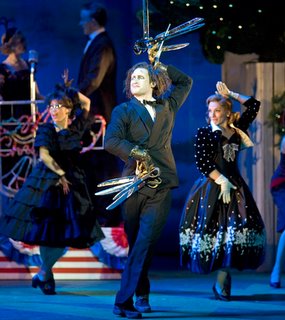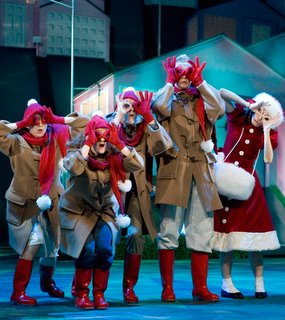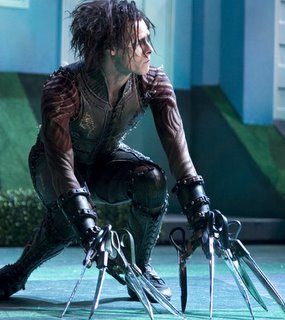Edward Scissorhands ~ from the big screen to the stage
 Director: Tim Burton
Director: Tim BurtonWritten by: Tim Burton and Caroline Thompson
Cast: Jonny Depp as Edward Scissorhands, Winona Ryder as Kim and Dianne Wiest as Peg, amongst others
Year: 1990
Language: English
Country: USA
Runtime: 105 min
 Director: Matthew Bourne (musical Mary Poppins)
Director: Matthew Bourne (musical Mary Poppins)Music composer: Terry Davies
Cast: Sam Archer as Edward Scissorhands, Kerry Biggin as Kim Boggs et al
Two acts
After re-watching the film on a DVD, I booked a ticket for the theatre/dance adaptation at the Sadler’s Wells in Islington (
The stage version was a mixture of dance, theatre and musical without words and was rather faithful to the original film directed by Tim Burton, within certain (technical) limits. All the settings and costumes were delightfully recreated with admiring accuracy. However, the dance, choreographed by Matthew Bourne, and the live music, composed by Terry Davis, gave a new dynamic and rhythm to the story, which was generally more joyful and comic than the cinematic version and simplified to suit the needs of a bi-dimensional space. The result was still as poignant as the original. For exactness’ sake, let it be pointed out that only the opening and final scenes actually incorporated some variations to the plot, which, although significantly different, did not spoil the zest of the story. Through the initial scene narrating Edward’s conception, Bourne gave a personal justification of Edward’s scissor-hands by offering an *ancestral* background to the story: the inventor’s son had previously died in green age while playing with scissors, making Edward’s scissor-hands the lively result of his patron’s nostalgic fantasies. Whereas, in the film we only know that Edward is unfinished and that this stage is simply a(n odd) intermediate step towards the final human being he was planned to be.
A dive into the story
Edward Scissorhands is a moving family story in which reality is odder than fantasy, and the meeting of the two realms is as dramatic as we could expect. The neat contrast between the suburb where apparently happy and ordinary families live and Edward’s gothic estate look impossible to conciliate.
At a closer look, this cheerful village is the caricature of a hypocritical American middle class society. The historical setting of the film was in fact undefined, and therefore timeless, oscillating between the fifties and the eighties, or even the nineties (for the extravagant futuristic haircuts ably styled by Edward); whereas, the stage director opted for an ironic and caricature-style representation of a more defined fifties American micro-society through the employment of an eclectic choreography mixing ballet, modern dance, folkloric balls and Grease type of dances.
 The encounter with this bizarre community, where people lived in pastel coloured detached houses with coordinated cars and coordinated life styles, was at first less traumatic than expected. Edward was warmly welcomed by his host family and soon attracted the interests of the locals treating him as a zoo animal and, sometimes, with the bigoted pity for a disabled, but always with a basic respect. Long before his exposure to society, in the film more than on stage, Edward’s awareness of his limitations were clearly stressed, and this self-conscience made him paradoxically more human than the other characters. By way of example, in the film, his host mother looked an exceptionally (and therefore otherworldly) good-hearted mother and wife, and an outsider herself, with an economically unfulfilling job, a matter-of-fact husband and a tactless teenage daughter. For this reason, she shared an intellectual affinity with Edward and showed an unconditioned love and care for his situation since their first meeting.
The encounter with this bizarre community, where people lived in pastel coloured detached houses with coordinated cars and coordinated life styles, was at first less traumatic than expected. Edward was warmly welcomed by his host family and soon attracted the interests of the locals treating him as a zoo animal and, sometimes, with the bigoted pity for a disabled, but always with a basic respect. Long before his exposure to society, in the film more than on stage, Edward’s awareness of his limitations were clearly stressed, and this self-conscience made him paradoxically more human than the other characters. By way of example, in the film, his host mother looked an exceptionally (and therefore otherworldly) good-hearted mother and wife, and an outsider herself, with an economically unfulfilling job, a matter-of-fact husband and a tactless teenage daughter. For this reason, she shared an intellectual affinity with Edward and showed an unconditioned love and care for his situation since their first meeting.
Edward, interpreted in an equally amazing manner by an expressive Jonny Deep in the cinema version and by Sam Archer in the dance performance, responded to all these attentions with shyness, embarrassed clumsiness, sweetness and love. Jonny Depp’s acting strength was all concentrated on his sullen face, made possible by the frequent cinematic close-ups communicating fear and sorrow with little dialogue, while Sam Archer’s vigour was based on his faultless movements.
Not used to voice his feelings through words, Edward expressed his affection through art. He was a talented gardener; an inventive sculptor; and a creative hairdresser, whose abilities and the charm he naturally emanated (through his gaze in the film and through the dance movements in the performance) quickly captured the town’s inhabitants. Thus, there seemed to be all the premises for Edward’s successful integration into society. Unfortunately, at the first incident shaking the community’s peace, fingers are soon pointed against him. Edward, well aware of the destructive potential of his hands, always tried to contain his emotions accordingly, but when his sense of justice prevailed and his feelings of provoked rage finally exploded, the outcome was devastating. Regardless the efforts of his adoptive family to rescue him and his reputation (another detail bypassed in the theatre adaptation), an inexorable cause-effect chain kicked off making the union a utopia. These last emotional scenes were movingly performed on stage, demonstrating Bourne’s capability to shift from jubilant and hilarious scenes to a dramatic final act.
A parallel
Edward’s story inevitably reminded me Frankenstein’s *monster* and his encounter/clash with the real world. Both characters (Edward and Frankestein’s unnamed creature) are profoundly human and endowed with a fine sensitiveness. In Frankenstein’s book, the creature’s human side is due to his nature: he is in fact made of assembled corpses’ limbs. But, unlike Edward, he was not loved by his creator; he was instead rejected by Frankenstein, once this latter acknowledged the aberration of his invention which had defeated any scientific boundaries. On the contrary, Edward was cared and looked after by his *genitor* who had great plans for his development. As explicitly chronicled in the film (but not on stage), Edward’s spiritual side was nourished with poetry and literature, until his *father* unexpectedly passed away leaving him alone, unfinished and isolated.








<< Home